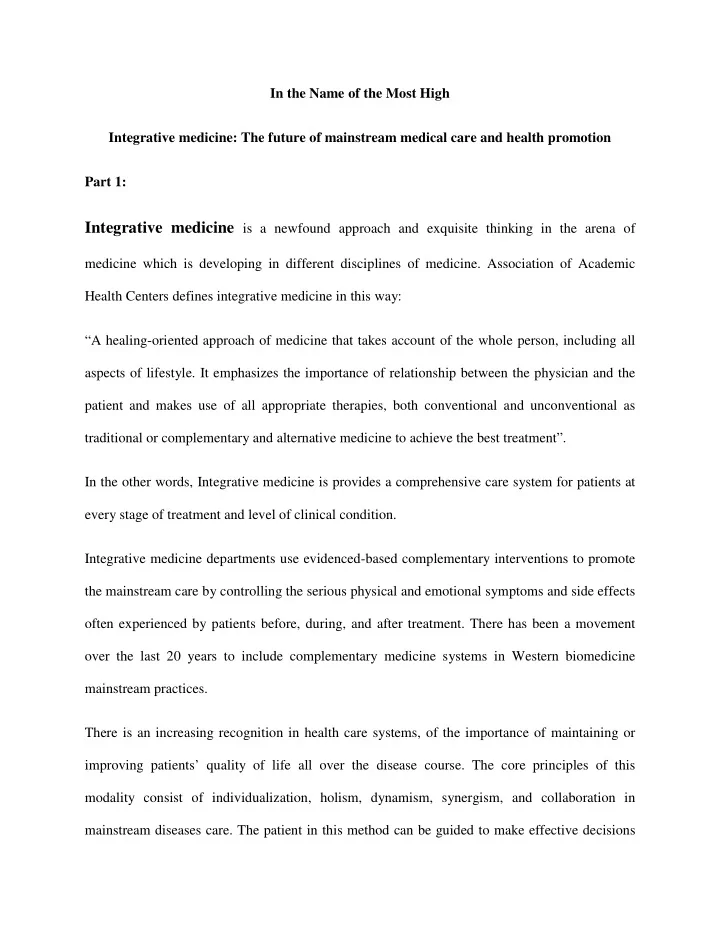

In the Name of the Most High Integrative medicine: The future of mainstream medical care and health promotion Part 1: Integrative medicine is a newfound approach and exquisite thinking in the arena of medicine which is developing in different disciplines of medicine. Association of Academic Health Centers defines integrative medicine in this way: “A healing-oriented approach of medicine that takes account of the whole person, including all aspects of lifestyle. It emphasizes the importance of relationship between the physician and the patient and makes use of all appropriate therapies, both conventional and unconventional as traditional or complementary and alternative medicine to achieve the best treatment”. In the other words, Integrative medicine is provides a comprehensive care system for patients at every stage of treatment and level of clinical condition. Integrative medicine departments use evidenced-based complementary interventions to promote the mainstream care by controlling the serious physical and emotional symptoms and side effects often experienced by patients before, during, and after treatment. There has been a movement over the last 20 years to include complementary medicine systems in Western biomedicine mainstream practices. There is an increasing recognition in health care systems, of the importance of maintaining or improving patients’ quality of life all over the disease course. The core principles of this modality consist of individualization, holism, dynamism, synergism, and collaboration in mainstream diseases care. The patient in this method can be guided to make effective decisions
about the most helpful integrative therapies throughout their treatment program and beyond; especially by modifying lifestyle to improve their health status will help It is essential to patient care team to pay enough attention to safety, standardization, and quality of therapeutic methods and improper drug interactions, should be considered. Care for quality of life makes a connection between the patient and patient care team. This means that both treatment and patient’s quality of life are of high importance for patient care team. Complementary methods have played a significant role in this situation for enhancing quality of life, reduced severity of symptoms and side effects, and developed general wellbeing in patients. Integrative medicine can be negotiated as a new considering and approach to better management of the patients to improve quality of life and treatment results. Persian Medicine as a Traditional Medicine system consists of the sum total of all the knowledge and practices used in diagnosis, prevention and elimination of diseases in Persia from ancient times to present. It is based entirely on practical experience and observations passed down from generation to generation. Traditional medicine has the advantage of being considered as part of the culture therefore, bypassing cultural issues that may affect the practice of medicine. On the other hand, it can be used in conjunction with and as an aid to the conventional medicine. Development and promotion of traditional medicine could be considered as respect and honor to the culture and heritage of the people all around the world and as an example of the democratization of medicine but based on research and evidence-based education.
Part 2: 1. Persian medicine is a part of the culture and history of Iran and Today the Islamic Republic of Iran is moving towards discovering its useful medical treasures to share with mankind all over the world and to take its role in the worldwide move towards integrative medicine. In this path traditional medicine can be used in conjunction with and as an aid to the conventional medicine. In accordance with the WHO's strategy, the old but useful remedies should be integrated in the conventional medicine for the benefit of humanity. 2. Improving lifestyle, health promotion and prevention are the most important component of the development of traditional medicine in society, in order to reduce the incidence and prevalence of chronic diseases in society. 3. Some debates and disagreements, such as science and pseudoscience, are related to paradigms and philosophical misconceptions, and they are not in the realm of pragmatic medicine because one who believes in a paradigm can not completely dismiss another. In medicine, science and practice is more important on the condition of safety and effectiveness.
Recommend
More recommend